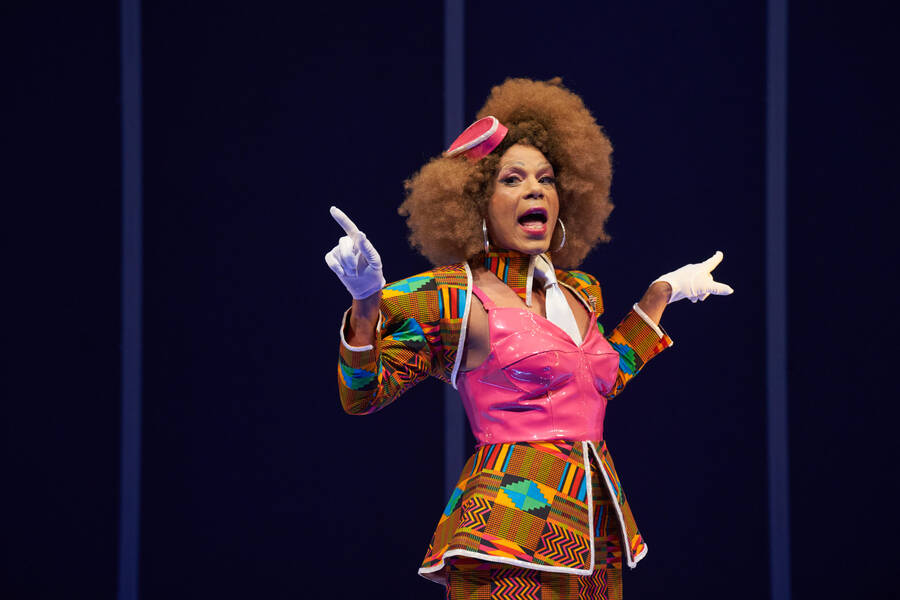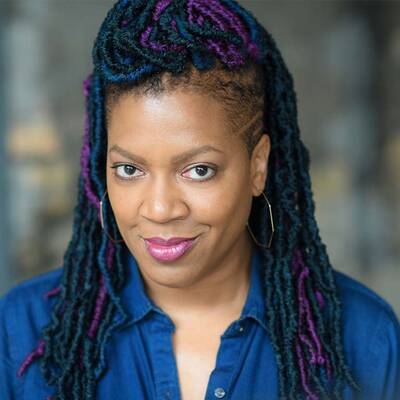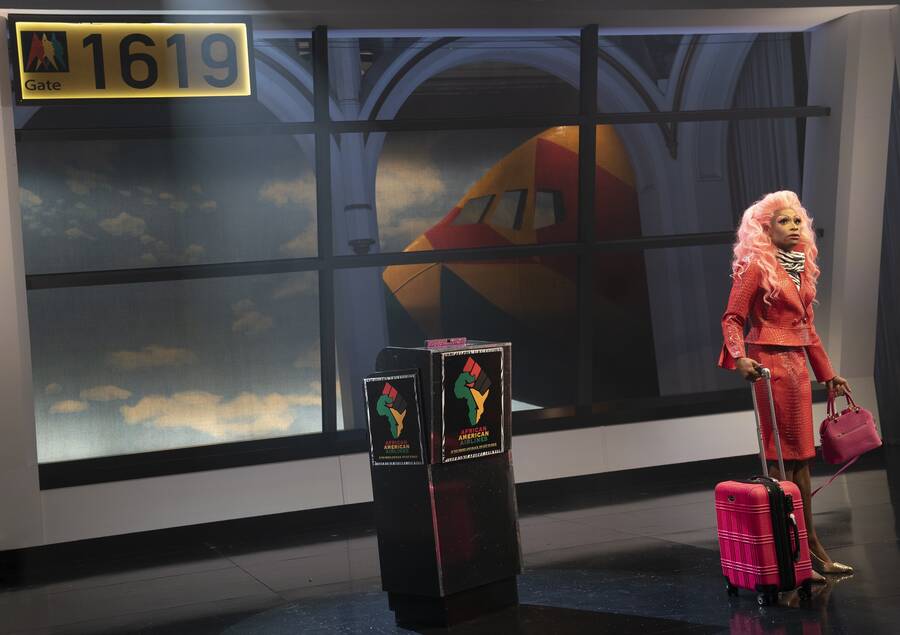All aboard the last flight to Africa from the United States of America! Since the Obama era didn’t deliver on burying the N-word, a plane ticket to freedom is all that’s left.
In Jordan E. Cooper’s satirical Ain’t No Mo’, there is no 40 acres and a mule or Freedmen’s Bureau to stand up to plantation owners, let alone latter-day white supremacists. So Black Americans have been offered a one-way ticket to any African or Caribbean country that shows up on their at-home DNA testing kits. And America—God bless her heart—will have to figure out how to go on without their cultural contributions.
While Ain’t No Mo’ continues its regional premiere at Baltimore Center Stage (BCS) through Nov. 20, in a co-production with Woolly Mammoth Theatre that ran at the Washington, D.C., theatre Sept. 11-Oct. 9, it begins previews tonight on Broadway, in a version of the Public Theater production that ran in 2019.
Director Lili-Anne Brown, who helmed the Baltimore/D.C. production, said she was attracted to the script because it felt deeply familiar.
“Ain’t No Mo’ is recognizable to us—it’s our stuff,” she said. “Jordan has made this art that is referencing our insides and our ways, what we do, how we do, and it’s written in a way that speaks to us. That is very much from us, from our insides. It’s also the deepest human stuff, so it’s recognizable by anyone, but there’s the Blackness of it all.”

Cooper started writing the play as an undergraduate student at the New School in New York City. It was 2016, and that summer Alton Sterling and Philando Castille had just joined the long list of Black men publicly killed by police. Cooper started out by writing a raucous church scene, in which a preacher tells his congregation that since Barack Obama has been elected, “Ain’t no mo’ b.s.” The preacher enthusiastically enumerates: “Ain’t no mo’ shuckin’, ain’t no mo’ Amos, ain’t no mo’ Andy, ain’t no mo’ Emmett Till, ain’t no mo’ Rodney King, ain’t no mo’ Jena Six, ain’t no mo’ Stop, ain’t no mo’ Frisk.”
Still, Cooper understood that after Trayvon Martin, Michael Brown, Jordan Davis, and countless others fell to the bullet, the elation that so many African Americans felt after the election of the first biracial president had been short-lived, and was already by then eight years in the past.
“During that summer of 2016, I wished there was a day when you could call in Black,” Cooper said. “I didn’t have energy to process that. This play is my catharsis for that moment and the moments that came after. I am a person who has a dark sense of humor. I have to find the light somewhere in the darkness.”
Theatre has always been where Cooper finds the light. He grew up in rural Texas, where access to live theatre was nearly non-existent. He says his introduction to the medium was sitcoms, which he thinks of as “theatre with cameras,” as well as DVDs of Tyler Perry’s stage plays. It was until high school and college that he was introduced to Neil Simon, August Wilson, and other crafters of the American canon.
“The thing about the Chitlin’ Circuit is that those plays don’t have rules, but a lot of American theatre does,” Cooper said. “I’m very grateful that those plays give me permission to be free. I dug in with my own set of rules, and I was able to carve out my own space.” He said that Stevie Walker-Webb, director of the Public/Broadway production, calls the play “chitlins on fine china.”
Cooper conceived Ain’t No Mo’ as a series of vignettes that invite us into the lives of a variety of Black folks as they prepare for that last flight out of the U.S.: reality stars, baby mamas, drag queens, inmates. The play is both hilarious and hard-hitting, delivering a strong punch in the face of exploitative capitalism. In one scene mimicking a reality show reunion, Cooper examines the cost of selling circumscribed images of Black women.
Tracy: (Cackles) Bitch, how many baby daddies is that now?
Kendra: This number four. I’m coming up in the world.
Karen: Ok, you almost catching up, I see you, I’m still at six.
Tracy: I’m staying at seven for life.
Rachonda: Seven ain’t shit.
Tracy: How many you got?
Rachonda: It depends on which one of them you ask, cause you know I used to be a hoe.
Silence. The line is stuck in Tracy’s throat.
Rachonda: “Bitch, we all hoes. Bitch, we all hoes. Bitch, we ALL HOES!”
Producer: Cut!
Soon after Cooper started writing Ain’t No Mo’, he met Walker-Webb, who is also from Texas, and who became his friend, collaborator, and director; at the time he was in the MFA program at the New School and was also a 2050 Fellow at New York Theatre Workshop. The two bonded over their frustration in not seeing themselves or their culture reflected in the academic setting. Cooper showed Walker-Webb a short scene he was working on, and the rest is history.

“He came over my house and he told me he was working on a script, and he only had the Peaches monologues,” Walker-Webb said, referring to the pink-haired flight attendant from African American Airlines who memorably opens the show. “I had no idea that meant he was going to sit in my living room for a week in my favorite chair and eat all my food! The play fell out of him. I remember waking up at 2 a.m. on a Sunday morning and the whole place was dark except for that blue light coming from his laptop.”

It wasn’t just the play’s premise, which flirts with the temptation to simply flee American racism, that resonated with Walker-Webb; a harrowing scene about a man killed by police also stuck with him. In 2013, one of his fraternity brothers was killed by police officers in Kaufman County, Texas, and the family’s wrongful death case is still outstanding. Walker-Webb said the incident sent him to the verge of a psychotic break. After spending two years protesting and organizing, Walker-Webb applied for a travel grant to go to South Africa in 2016, where he studied the Truth and Reconciliation Commission to process his experiences. He said Ain’t No Mo’ makes him feel seen.
“It’s a magnum opus for Black Americans—I think it’s the greatest play written in the last century,” Walker-Webb enthuses. The key to its success, he said, is that Cooper “satirizes things that are traumatic for us. The play is a reminder of our resilience.”
It was also a calling card for Cooper. When director and producer Lee Daniels, who is known for the films Precious, The Butler, and The United States v. Billie Holiday, saw Ain’t No Mo’ at the Public, he was looking for a head writer for the BET+ sitcom The Ms. Pat Show. He ended up not only hiring Cooper to become one of the youngest TV showrunners ever; he also committed to getting Ain’t No Mo’ to Broadway.

For her part, Lili-Anne Brown—a Chicago-based director whose credits include Cullud Wattah at Victory Gardens, Once on This Island at Oregon Shakespeare Festival, and School Girls; or The African Mean Girls Play at the Goodman Theatre—said that Cooper’s script aligns with her core belief that life is absurd. For her production, she leaned into the humor.
“I love the wildness of it,” said Brown, who also had a stint with Second City. “I’m a pop culture junkie and I’m a comedy person. There’s not a great deal of Black parody and things that push the envelope comedically that are up to the minute.”
Cooper started out writing Ain’t No Mo’ with the thought experiment, What if we all just left? But he said that the writing process, and his prep for the Broadway run, has brought him to a different conclusion.
“I had to work through the reality that we are America,” Cooper said. To leave “would be throwing away all the work we put in. What’s so beautiful about African American culture is that we made a culture out of nothing. We took mud, two sticks, and pieces of tree, and made a culture.”
Kelundra Smith (she/her), a writer based in Atlanta, is a frequent contributor to this magazine.


